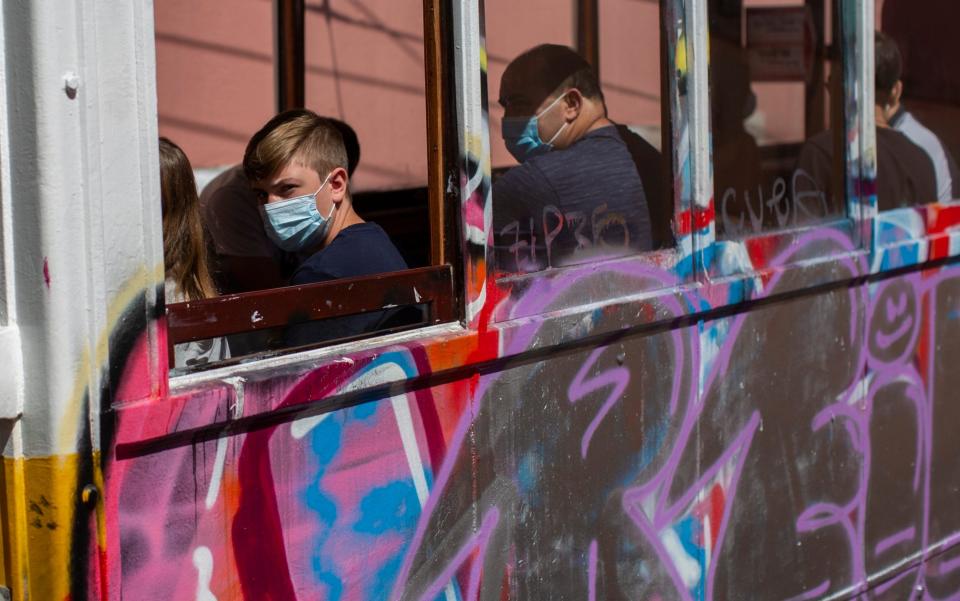The basics of Covid hygiene seem to have passed many Britons by


His face was covered with a crisp, clean surgical mask, but there was an unmistakable weariness in his eyes, and perhaps a hint of pity.
The smartly-dressed attendant at Lisbon airport was trying to explain to a newly-arrived Briton that the grubby cloth on his face should be covering his nose as well as his mouth, and that he should rinse his hands with the alcohol provided in the foot-operated dispenser directly in front of him. And, yes, his wife and children should do the same.
The passenger, a respectable family man, was bemused, repeatedly pointing to his half-hitched mask and giving the thumbs-up. Only after the attendant briefly lowered his own mask and then returned it did the lights come on. The queue breathed a sigh of relief as the family adjusted themselves and headed off amid a loud chorus of "obrigados!".
I've spent a lot time in Portugal over the course of the pandemic, and it seems people there "get" the basics of Covid hygiene in a way that has somehow bypassed us Britons. Friends in Spain, France and Italy say it is the same there.
Almost every shop, restaurant, bar and supermarket has hand sanitiser at the door, and you don't get in without using it. People wear clean surgical masks (€17 for a pack of 50) whenever they enter an enclosed public space, adjusting them properly and donning them even when they go to the loo in a bar or restaurant. There are few queues and no crowding.
And here's the paradox. Life feels more normal in these places than it does at home. In the towns and villages on the coast above Lisbon, you would struggle to know that a pandemic is going on. Even the elderly are out and about and getting on with life. Most businesses are open and seemingly well on the way to recovery, because people feel safe using them.
Even on the surf break, the talk has turned from crisis to cautious optimism. "It's not over, but people are together," says Bruno Bairros, a friend of 15 years who runs a Covid-secure and rapidly rallying local surf business.
In Britain, by contrast, angst defines the national mood. No one appears to know what the rules are any more, but we like to quarrel over them.
The nation lives in fear of a second wave, yet appears not to have the faintest clue about how to guard against it. Some loudly insist coronavirus presents "no risk at all". Others, equally credulous, daren't step from their homes lest they be immediately struck down.
From an economic perspective alone, the situation is terrifying. In many ways, we seem less prepared as a populous for the next instalment of this crisis than we were in March when cases were climbing across continental Europe (in a not dissimilar pattern to now). At least for a few weeks way back then, hand-washing caught on (as seen in the video below).
Now things are, in the word of the day, chaotic. Few shops have sanitiser at the door, let alone in easy to use dispensers, and this applies to the big national chains as well as to corner shops. Pubs and restaurants wonder why they are not doing much business despite staff wandering about maskless and shouting orders across the floor.
Even the police, initially admonished for over-reacting, have had to dust off their drones again to try and stop oversized parties and wedding receptions. The revellers seem blissfully unaware that they risk super-spreading the virus throughout their own neighbourhoods.
I'm aware much of this will be taken as hectoring. But my point is that by ignoring the basics of good hygiene – measures that can be adopted painlessly as a habit in a matter of hours – we are making things much more difficult for ourselves in Britain.
The nation seems rightly united on the need for schools to open in two weeks and stay open, yet we appear blind to the fact that our collective indiscipline is likely to render that a pipe dream.
No doubt much of the blame for Britain's failure to adopt the basics of good Covid hygiene is down to the yo-yoing of ministers. But as much as I would like to see Professor Chris Whitty, the chief medical officer, back on television giving a 10-minute tutorial between programmes, I fear the politics of blame now make that impossible.
In his absence, sceptical readers might turn to this video of Dr Mike Ryan, of the World Health Organisation, saying it as it is. His words, far from nannying, are deeply rooted in the concepts of personal responsibility and individualism.
"Everyone needs to look at their own risk... we do this every day of our lives as human beings, we manage risk," he says. "We can be advised by government, we can be advised by science. But in the end, this comes down to personal motivation and personal choice. If it doesn't feel safe, it isn't safe."
Hopefully the case numbers, now mounting again here and on the continent (see graphic above) – including rising hospitalisations and deaths in Spain – will peter out and we will escape a second wave this winter. But we need to be braced and ready for it.
As one scientist, observing how most of America did nothing to adapt as even as Florida's recent cases mounted, put it: "The curse of SARS-CoV-2 seems to be that we aren't willing to look at what happens to others and imagine it could happen here too."

